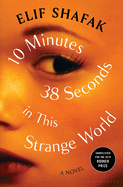
| Publisher: | Bloomsbury | |
| Genre: | Women, Friendship, Literary, Fiction | |
| ISBN: | 9781635574470 | |
| Pub Date: | September 2019 | |
| Price: | $27 |
| Starred | Fiction |
by Elif Shafak
10 Minutes 38 Seconds in This Strange World, a 2019 Booker Prize finalist by British-Turkish author Elif Shafak, celebrates the memories and friendships that sustain people in difficult times. The story is told through the lens of a sex worker known as Tequila Leila, who works on Istanbul's Street of Brothels--a life that exposes her to violence, danger and, remarkably, true love.
Leila is dead when readers meet her, the victim of a gruesome murder, but her brain has yet to shut down. In the 10 minutes and 38 seconds before it does, Leila recalls vivid smells and tastes that bring to the surface long-forgotten details of her traumatic childhood, joyous marriage and poignant relationships with others living on the margins of society.
The novel focuses not on Leila's death but the richness of the life she led. There's so much more to the enigmatic protagonist than her sordid job. It is Leila's multi-textured existence and legacies that Shafak unveils, alongside the mystery of the woman's murder, as the minutes wind down. The story eventually shifts into a high-stakes adventure as Leila's friends risk everything to pay a final tribute to the woman who binds them together. Friendship, it turns out, is Leila's truest legacy of all.
Shafak (Three Daughters of Eve, Honor) portrays Istanbul in all its glorious chaos against the backdrop of civil unrest that culminated in the Taksim Square Massacre of 1977. Despite being harassed by Turkish authorities for her depiction of sexual violence, the author uses the megaphone of her 12th novel to further expose female exploitation and sexual abuse. In this way she succeeds in giving a voice to the voiceless. --Shahina Piyarali, writer and reviewer
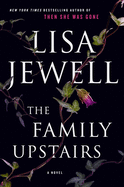
| Publisher: | Atria | |
| Genre: | Women, Psychological, Domestic, Suspense, Thrillers, Fiction | |
| ISBN: | 9781501190100 | |
| Pub Date: | November 2019 | |
| Price: | $27 |
| Mystery & Thriller |
by Lisa Jewell
Libby has been a budget watcher her whole life. She shops at T.J. Maxx and celebrates a small raise at work by buying one eye shadow from a department store instead of her usual drugstore. Then she turns 25 and receives a letter saying she's just inherited from her birth parents a mansion on the finest street in the Chelsea area of London.
Meanwhile, Lucy receives a text saying, "The baby is 25," and urgently seeks a way to travel with her two kids and dog from France to England. The problem: she's currently homeless, has no passports or money and is hiding from the law.
Libby's and Lucy's present-day chapters alternate with accounts that take place in the past, told from the point of view of a boy named Henry. He lived with his family in the above-mentioned Chelsea mansion until his mother took in temporary boarders--and they never left. Not only that, the interlopers invited friends over and soon the strangers had taken command, imprisoning Henry's family in their own home--until one night when police arrived to find multiple dead bodies and a crying baby.
The way Lisa Jewell brings these plotlines together in The Family Upstairs continues to solidify her reputation as a master weaver of stories. She takes a hard-to-believe situation--wickedness seeping into and taking over a seemingly normal household--and makes it plausible. The story twists in unpredictable, disturbing ways, and shows how hard it is to repel evil when it has invaded one's home. --Elyse Dinh-McCrillis, blogger at Pop Culture Nerd
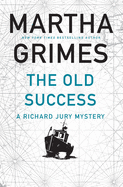
| Publisher: | Atlantic Monthly Press | |
| Genre: | Mystery & Detective, General, Suspense, Thrillers, Fiction | |
| ISBN: | 9780802147400 | |
| Pub Date: | November 2019 | |
| Price: | $26 |
| Mystery & Thriller |
by Martha Grimes
It's only fair: in Vertigo 42, New Scotland Yard superintendent Richard Jury sought help from his old schoolmate, Devon-Cornwall police commander Brian Macalvie. In The Old Success, Macalvie has Jury return the favor when a woman dead from a gunshot is found on the beach at Bryher's Hell Bay, on the Isles of Scilly. The victim, a Frenchwoman, was staying at the Hell Bay Hotel for reasons unclear.
Soon Jury has another bullet-felled corpse to deal with: at a country estate in Northampton, Flora Flood was training a gun on her husband, from whom she had been separated for two years, when he was fatally shot--but not by her, she claims. Following a third murder by bullet--this time at Exeter Cathedral--Jury initially resists the idea that there's a single killer responsible: How could this be possible when the three murders are geographically scattered? But, then, this is a Martha Grimes mystery.
The Old Success, Grimes's 25th Jury novel, has the hallmarks of her beloved series: a twisty plot, rat-a-tat banter and a scramble of oddball characters, many from previous Jury titles. (While appreciating The Old Success doesn't require a familiarity with the earlier Jury books, knowing something about these eccentrics will serve readers well during the carnivalesque pub scenes.) Grimes is also generous with side plots; one supplies comic relief via Jury's frequent right hand, amateur sleuth Melrose Plant, whose social-climbing American aunt may drive him to commit a crime of his own. --Nell Beram, author and freelance writer
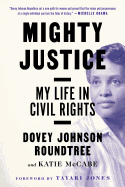
| Publisher: | Algonquin | |
| Genre: | Biography & Autobiography, Women, Lawyers & Judges, Cultural, Ethnic & Regional, African American & Black | |
| ISBN: | 9781616209551 | |
| Pub Date: | November 2019 | |
| Price: | $16.95 |
| Starred | Biography & Memoir |
by Dovey Johnson Roundtree, Katie McCabe
After her father dies in the flu epidemic of 1919, five-year-old Dovey Johnson Roundtree moves with her sisters and mother into the Charlotte, N.C., home of her maternal grandparents. The adults, while poor, see to it that the girls get college educations--"the 'way out' for black people," Roundtree writes. In 1941, she heads to Washington, D.C., making use of her well-connected grandmother's acquaintance with Mary McLeod Bethune, adviser to President Roosevelt. Bethune is in charge of enforcing Roosevelt's ban on racial discrimination in hiring, including in the military. Feeling obliged to support the cause, Roundtree is among several dozen black women who enlist in the newly formed Women's Army Auxiliary Corps. After the war ends, she still wants a career in medicine, but goes to Southern California to make "conversion speeches" on behalf of Roosevelt's Fair Employment Practices Committee. In California, she meets the trailblazing black feminist lawyer Pauli Murray, who tells Roundtree that "the answer for black people... lay in the law."
Roundtree enrolls at Howard University School of Law in 1947, and upon graduating, opens a practice with a black male colleague in the capital, where "a black lawyer had to leave the courthouse to use the bathroom or eat a meal." Her memoir, Mighty Justice, devotes individual chapters to Roundtree's most significant cases, like the desegregation powder keg Sarah Keys v. Carolina Coach Company.
In this apparent golden age of memoir, some stories shine brighter than others. Mighty Justice: My Life in Civil Rights is one lucent example of the brighter variety. --Nell Beram, author and freelance writer
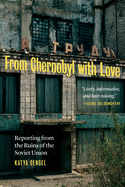
| Publisher: | Potomac Books | |
| Genre: | Biography & Autobiography, Russia & the Former Soviet Union, Personal Memoirs, History | |
| ISBN: | 9781640122048 | |
| Pub Date: | November 2019 | |
| Price: | $29.95 |
| History |
by Katya Cengel
Journalist Katya Cengel (Exiled, Bluegrass Baseball) details her experiences living and working in post-Soviet Eastern Europe following the fall of the Berlin Wall and amid the lingering consequences from the Chernobyl nuclear disaster.
In 1998, Eastern Europe was undergoing rebirth and so, too, was enthusiastic and adventurous Katya Cengel. The 22-year-old California native and recent college graduate took a job in Riga, Latvia. As an aspiring journalist, she hoped her work at the Baltic Times would launch her career. Instead, Cengel faced culture shock--and loneliness. It wasn't easy to acclimate to environs where basics like running water, electricity and heat were often sparse. Cengel shares stories of early writing assignments and efforts to prove her worth, along with the challenges she faced as an American in dating and forming friendships. Corruption was widespread during this time of economic, social and political upheaval, and Cengel learned the hidden horrors of the "Soviet ideal of equality" when it came to ideas about women in the workforce and home. Cengel eventually went to work at the Kyiv Post in Ukraine, where her desire to visit--and write about--the Chernobyl nuclear power plant disaster changed her life in harrowing, toxic ways.
Courage, resilience and hard work ultimately bolstered Cengel's unrelenting desire to succeed. The forthright nature of her layered, illuminating perspective details her daring adventures and devastating heartbreaks at a formative time. From Chernobyl with Love allows readers a fascinating glimpse into Cengel's life and work as history unraveled. --Kathleen Gerard, blogger at Reading Between the Lines
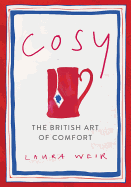
| Publisher: | HarperOne | |
| Genre: | Self-Help, Personal Growth, Happiness, Beauty & Grooming, Inspiration & Personal Growth, Body, Mind & Spirit, Health & Fitness, General, Self-Management | |
| ISBN: | 9780062948168 | |
| Pub Date: | November 2019 | |
| Price: | $19.99 |
| Social Science |
by Laura Weir
In Cosy: The British Art of Comfort, Laura Weir takes readers on a charming journey to explore the concept of coziness and how to cultivate it as a counterbalance to the hard edges of modern life. While the term cosy, as Weir experiences it, is essentially an English construct, it is also one that can be universally enjoyed and easily translates across cultures.
Seeking coziness is akin to seeking reassurance and security in a disorganized, overwhelming world. Some of the most basic pleasures, like a good nap, can be the most soothing, so there's nothing elitist or extravagant about leading a cosy life. It's accessible to anyone who wants to indulge and often it's found when people are focused on pleasing themselves instead of trying to impress others.
Written in a fun, conversational tone with lovely illustrations, Cosy is an appreciation of simple, predictable pleasures like a warm home, a favorite couch, a soft blanket and someone to snuggle with. It means nurturing in oneself a laid-back approach and a contemplative demeanor. After all, it's hard to imagine being cosy while feeling stressed or rushed.
Weir has a dynamic media presence in London; she is a journalist and editor familiar with the noise and bustle of city life. A favorite childhood memory inspired her to seek coziness and prioritize it in her adult life. Weir's references to British shops, television programs and countryside destinations provide an intriguing glimpse into the world of a Londoner seeking cosy contentment and inspires readers to seek similar comforts within their own environments. --Shahina Piyarali, writer and reviewer
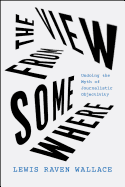
| Publisher: | University of Chicago Press | |
| Genre: | Media Studies, United States, Journalism, General, Language Arts & Disciplines, History, Social Science | |
| ISBN: | 9780226589176 | |
| Pub Date: | October 2019 | |
| Price: | $25 |
| Reference & Writing |
by Lewis Raven Wallace
Accusations of bias and "fake news" plague journalists today, while the 24-hour news cycle creates constant pressure, and news outlets of all political persuasions claim to be objective. In his first book, The View from Somewhere, transgender journalist Lewis Raven Wallace delves into the concept of objectivity and asks what role journalism should play. He begins with #BlackLivesMatter and #MeToo, both movements shaped by citizen journalism and grassroots organizations operating outside the mainstream media. He examines the tangled connections between facts, truth, point of view and "neutrality" in reporting, using events like the Vietnam War and the AIDS crisis as case studies. He interviews journalists who covered both and ran into trouble for reporting inconvenient facts, or letting their human perspectives show through in their pieces.
Arguing passionately for fact-based, thoughtful, intelligent journalism, Wallace also posits that no journalist can--or should--completely set aside their own perspective. "I don't believe that there is only one truth, but I still believe that truth is worth pursuing," he writes. Later, he urges his fellow journalists to pursue activism if they so choose, subverting the long-time practice of having to choose one or the other. He holds up curiosity as an antidote to misinformation and calls on his colleagues to write from "a place of hope and principle." For reporters and consumers of the news alike, Wallace's book is a fascinating account of how we arrived at this moment, and an urgent, thoughtful case for independent, humane journalism. --Katie Noah Gibson, blogger at Cakes, Tea and Dreams
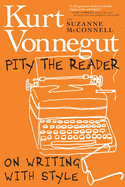
| Publisher: | Seven Stories Press | |
| Genre: | Personal & Practical Guides, Style Manuals, American, Reference, General, Literary Collections, Language Arts & Disciplines | |
| ISBN: | 9781609809621 | |
| Pub Date: | November 2019 | |
| Price: | $32.95 |
| Reference & Writing |
by Kurt Vonnegut, Suzanne McConnell
Pity the Reader: On Writing with Style is less is a book about the writing craft than it is an homage to Kurt Vonnegut--as writer, teacher and human being.
The publisher describes the book as written by Vonnegut and Suzanne McConnell, who studied with Vonnegut at the Iowa Writer's Workshop and taught writing for many years at Hunter College. And in fact, Vonnegut did write a large portion of the book, though not directly for Pity the Reader. McConnell shares nuts-and-bolts writing advice and larger thoughts on the creative process, pulled from Vonnegut's novels as well as from his lectures and essays on writing. She sets that advice within the context of anecdotes from his life, many of them drawn from her own long friendship with him. For example, McConnell shares Vonnegut's advice on the tricky question of an author's voice: "Sound like yourself." She then reinforces it, first with Vonnegut's self-deprecating description of his own native voice and then with an anecdote about a time when he tried to abandon that voice in favor of something more urbane. (He was told, "Go for Will Rogers, not for Cary Grant.") It's a powerful lesson on a subject many writers struggle with, but also tells us a great deal about Vonnegut himself.
In the end, Pity the Reader is an extended meditation on Vonnegut's dictum "The primary benefit of practicing any art form... is that it enables one's soul to grow," using his own life as the case study. --Pamela Toler, blogging at History in the Margins
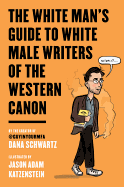
| Publisher: | Harper Perennial | |
| Genre: | Form, Writing, General, Language Arts & Disciplines, Humor, Essays, Parodies | |
| ISBN: | 9780062867872 | |
| Pub Date: | November 2019 | |
| Price: | $16.99 |
| Humor |
by Dana Schwartz, illust. by Jason Adam Katzenstein
Dana Schwartz (Choose Your Own Disaster) here parlays her popular satirical Twitter account @GuyInYourMFA into a hilarious, full-blown take-down of the many "genius" darlings of Western literature.
The White Man's Guide to White Male Writers of the Western Canon is a satirical compendium designed to send up those annoying, brooding know-it-alls who haunt Brooklyn coffee shops. Schwartz succeeds in establishing the persona of said mansplainer in a thorough introduction that tells readers, among other things, how to dress like a white male writer so that your art will be taken seriously: "Spend as much money on your glasses as you can in order to make it look like you spent no money at all." The book then offers short biographical sketches of famous white male writers, from Shakespeare to Jonathan Franzen, all whose genius is explained in great sarcastic detail. The New Yorker cartoonist Jason Adam Katzenstein illustrates with funny portraits and captions, and the two collaborators also offer extras like drink recipes for favorite writers and random factoids with which to impress people at parties.
Some jabs are thinner than others, while some of the jokes undoubtedly land. "Ernest Hemingway was a man's man," Schwartz declares in false earnestness. "He was born with a full beard and a cable-knit sweater." Despite its silliness, the book is actually informative. It provides a sly feminist critique of famous writers, focusing on how men treated women in real life. For example, the entry on David Foster Wallace details the revered author's alleged abusive and frightening behavior toward writer Mary Karr. "But that's just the kind of thing genius does," Schwartz exclaims in faux dismissiveness.
Above all, The White Man's Guide to White Male Writers of the Western Canon is a pleasure to read. Schwartz offers fun and irreverent iconoclasm with some serious undertones. --Scott Neuffer, writer, poet, editor of trampset
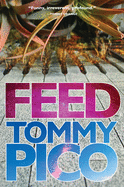
| Publisher: | Tin House | |
| Genre: | Love & Erotica, American, General, Poetry, Subjects & Themes, LGBT, Native American | |
| ISBN: | 9781947793576 | |
| Pub Date: | November 2019 | |
| Price: | $15.95 |
| Poetry |
by Tommy Pico
What characterizes Tommy Pico's fourth installment of his Teebs tetralogy is his sheer love of language. In Feed, Pico (Junk) lets go of all poetic conventions and expectations and allows his words to dip and soar on strange and beautiful trajectories.
Feed picks up where Junk left off. The poet--a queer member of the Kumeyaay nation--finds himself in an unpredictable New York City spring. He's on book tour, he's dating, eating, reading, writing, traveling. The spring becomes a metaphor for the wild vicissitudes of his life. "Springtime is so insecure, right?" he asks. The temperature fluctuations, the promise of summer, the vestiges of winter and the changing landscape all come to represent "the possibilities of jagged spring," mirroring the possibilities in his own life.
Whereas Junk is more linear in portraiture, Feed is discursive, ruminative and tangential. Pico employs a postmodern mash-up technique, mixing his thoughts with terrifying news headlines, missives to the reader, etymological explorations and, staying true to the spirit of Teebs, a list and discussion of pop songs. Teebs is Pico's poetic persona, an alter-ego, outrageous, funny and fearless in his own way. It's here that Pico ponders the performative nature of the persona, locating something within that is still shy and unsure about success. He dissects the difference between aloneness and loneliness, how he moves through the world as an alienated being, his psyche layered in cunning ways to survive.
How Pico pulls off this dazzling fusion of culture is his magic. Feed is engrossing, oddly enlightening and, above all, fun to read. --Scott Neuffer, writer, poet, editor of trampset
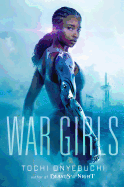
| Publisher: | Razorbill | |
| Genre: | War & Military, Dystopian, Family, Young Adult Fiction, Siblings | |
| ISBN: | 9780451481672 | |
| Pub Date: | October 2019 | |
| Price: | $18.99 |
| Starred | Children's & Young Adult |
by Tochi Onyebuchi
Tochi Onyebuchi's (Beasts Made of Night) fierce third work for young adults fictionalizes the Biafran-Nigerian War of the late 1960s and places it in the 2170s, in an effort to teach contemporary readers about the Nigerian military conflict and liberation movement. "Even now, as calls for secession grow anew," Onyebuchi's author's note states, "an entire generation has been raised in ignorance of the conflict. It is my hope that War Girls... can act as some sort of salve to the national wound."
Onyii began fighting in the War for Independence when she was eight, the "machine rifle in her hands" and the "machete strapped across her back" both dwarfing her tiny body as she moved "under cover of night... leaving behind a trail of bodies." At 15, she has given up war and is now one of the oldest girls in a Biafran refugee camp where she cares for her brilliant younger sister, a war orphan named Ify. When the Nigerians find the War Girl camp, the powerfully bonded sisters are split up and forced onto opposite sides of the bloody conflict.
The aspects of Onyebuchi's world--synths, androids, "massive humanoid robots," domed cities, bodyskins--create a sense of place and time while his staccato, biting style breathes life into the brutal war. Heavy and emotionally intense, there is little happiness to be found in War Girls, but Onyebuchi's skill in telling this story is joyful to behold. And, while the book painfully relates atrocities, it is optimistic, both in ending and intent. "It is my hope," Onyebuchi's note goes on to say, "that War Girls... will exhibit that emblematic Nigerian quality of taking pain and despair and dysfunction and transmuting it into something heartier, more fulfilling, more nourishing." --Siân Gaetano, children's and YA editor, Shelf Awareness
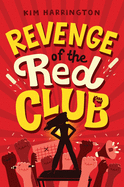
| Publisher: | Aladdin | |
| Genre: | School & Education, Social Themes, General (see also headings under Family), Girls & Women, Juvenile Fiction | |
| ISBN: | 9781534435728 | |
| Pub Date: | October 2019 | |
| Price: | $17.99 |
| Children's & Young Adult |
by Kim Harrington
It's bad enough when Hawking Middle School's administration suddenly starts dress-coding the girls--no leggings, no spaghetti straps, etc. But do they also have to go after the Red Club? As eighth grader Riley Dunne describes the weekly after-school club: "It's a period support group, but really, it's more than that. It's kind of like a sisterhood." Riley and her club friends smell sexism; as one points out, "Between shutting down the Red Club and enforcing this ridiculous dress code, it seems like they're targeting girls."
Principal Pickford says the club is being disbanded because it doesn't have an adviser, but he also admits that there's been a complaint against the group. Riley, the school newspaper's investigative reporter, decides to use her journalistic chops to unmask the "secret complainer." Meanwhile, the club won't go down without a fight; this will involve, among other things, revenge by maxi pad.
In journalistic terms, Revenge of the Red Club is a hard-hitting story with a human-interest angle. Thanks to Riley's breezy narration, the book's chatter about menstruation is unlikely to put off even readers who, like Riley's mom, are uncomfortable discussing "women's trouble." Kim Harrington, who has a clutch of YA and kids' titles to her name, conjures 1960s political activism through the Red Club's consciousness-raising-style meetings and civil disobedience, but her book also recalls 1980s teen movies in which students take a stand. Like the kids in The Breakfast Club, Revenge of the Red Club's rebels will have its audience's full support. --Nell Beram, freelance writer and YA author
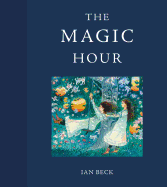
| Publisher: | Tate Publishing | |
| Genre: | Art, Fantasy & Magic, Imagination & Play, Juvenile Fiction | |
| ISBN: | 9781849766241 | |
| Pub Date: | October 2019 | |
| Price: | $16.99 |
| Children's & Young Adult |
by Ian Beck
As British artist and author Ian Beck explains in his afterword, he first visited London's Tate Gallery "as a callow art student." He discovered then his favorite painting in the collection: Carnation, Lily, Lily, Rose by John Singer Sargent. In a verdant Cotswolds garden, two young girls are seen lighting paper lanterns amid a profusion of shimmering greens and blooming flowers, the light "just right"--what Sargent called "the magic hour." More than 50 years later, Beck was "asked to thread a story and pictures around the twilight mood of this wonderful painting" aptly titled The Magic Hour. His gentle text runs alongside the rambunctious girls, growing in size and shape as they explore their summer home.
Sisters Lily, age 11, and Rose, age nine, spent "that hot summer long ago" in an old house near a river, surrounded by lush gardens. The girls "went everywhere together," never standing still. And always, "First Lily, then Rose," ran along meandering paths and enjoyed the swing under the shade of the old oak tree. With the growing heat, Mother bobbed the girls' long tresses, promising, "You'll feel much cooler now." One early evening, Rose noticed a golden flickering light emanating from the garden next door--and wondered if it might be a fairy. Telling Lily naturally induced further investigation, and together the sisters ventured into the moonlight for a night of magical discovery.
In a palette of soft blues and greens, Beck's beckoning watercolor illustrations re-create the garden's blooms, the girls' ruffled white dresses, their youthful gazes, the glowing lanterns of soft light. Beck's artistry expands Sargent's single canvas into a commemoration of sisterhood and an invitation to adventure--all while celebrating that Magic Hour of summer enchantment. --Terry Hong, Smithsonian BookDragon